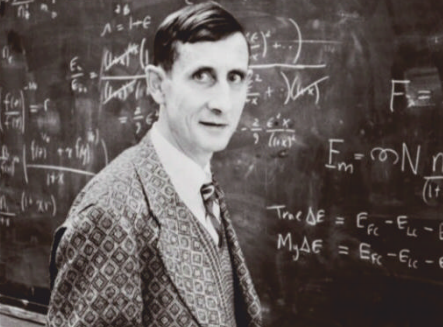Freeman Dyson, physicist and big thinker, died on February 28th, aged 96.
物理學(xué)家、偉大的思想家弗里曼·戴森于2月28日逝世,享年96歲。
There are, wrote Freeman Dyson towards the end of his long life, two different kinds of mathematicians. Some are birds, who fly high, surveying the broad vistas and spotting unexpected links between different bits of the mathematical landscape. Others are frogs, who prefer to be up close and on the ground, delighting in the details and the beauty of the flowers. He counted himself among the frogs, and started there.
弗里曼·戴森在他漫長(zhǎng)生命的最后寫(xiě)道,世上有兩種不同的數(shù)學(xué)家。有些數(shù)學(xué)家是鳥(niǎo)類,他們飛得很高,喜歡觀察廣闊的遠(yuǎn)景,發(fā)現(xiàn)數(shù)學(xué)景觀的不同部分之間意 想不到的聯(lián)系。其他的數(shù)學(xué)家是青蛙,他們更喜歡靠近地面,喜歡花朵的細(xì)節(jié)和美麗。他把自己看做青蛙那一類數(shù)學(xué)家,他也是從那里開(kāi)始。
At the age of 24 he made a fundamental contribution to the study of Diophantine equations, a branch of mathematics dating back to the ancient Greeks. A year later he resolved a tricky conundrum in quantum electrodynamics, a field so new that it had hardly existed when he was born. But already the airborne tendencies were stirring. He was fascinated by biology, engineering, international relations and, in particular, physics, at which he became a master. For him, it was an ideal subject. Its mathematical underpinnings might be abstruse and theoretical, but in the 20th century those theories handed blunt, world-changing power to nations that could master their applications.
24歲時(shí),弗里曼對(duì)丟番圖方程的研究做出了根本性的貢獻(xiàn),它是數(shù)學(xué)的一個(gè)分支,可追溯到古希臘。一年后,弗里曼解決了量子電動(dòng)力學(xué)中一個(gè)棘手的難題,這是一個(gè)在他出生時(shí)幾乎不存在的新領(lǐng)域。但其趨勢(shì)已經(jīng)開(kāi)始出現(xiàn)。他對(duì)生物學(xué)、工程學(xué)、國(guó)際關(guān)系學(xué),特別是物理學(xué)很感興趣,并成為了物理學(xué)大師。對(duì)弗里曼來(lái)說(shuō),這是一個(gè)理想的學(xué)科。它的數(shù)學(xué)基礎(chǔ)可能是深?yuàn)W和理論性的,但在20世紀(jì),這些理論把直接的、改變世界的力量交給了能夠掌握其應(yīng)用的國(guó)家。

In the second world war, he applied his mathematics at Britain's Bomber Command to calculate the most destructive (but safe) formations for the planes to fly in. After the war, when he moved to the Institute for Advanced Study in Princeton, he rubbed shoulders with both Albert Einstein, whose theorising on relativity he had revered since boyhood, and Robert Oppenheimer, who had developed the atomic bomb.
在第二次世界大戰(zhàn)中,弗里曼在英國(guó)轟炸機(jī)司令部應(yīng)用了他的數(shù)學(xué),計(jì)算最具破壞性(但是得安全)的飛機(jī)飛行陣型。戰(zhàn)后,當(dāng)弗里曼搬到普林斯頓高等研究院時(shí),他與阿爾伯特·愛(ài)因斯坦有過(guò)交情,他從小就尊崇愛(ài)因斯坦的相對(duì)論理論,還有羅伯特·奧本海默,原子彈的發(fā)明者。
譯文由可可原創(chuàng),僅供學(xué)習(xí)交流使用,未經(jīng)許可請(qǐng)勿轉(zhuǎn)載。











